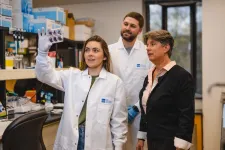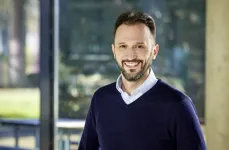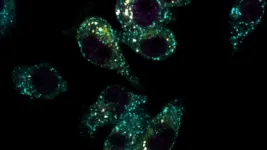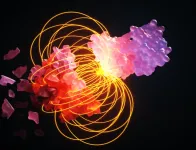(Press-News.org) PHILADELPHIA — (MAY 4, 2023) — The p53 gene is one of the most important in the human genome: the only role of the p53 protein that this gene encodes is to sense when a tumor is forming and to kill it. While the gene was discovered more than four decades ago, researchers have so far been unsuccessful at determining exactly how it works. Now, in a recent study published in Cancer Discovery, a journal of the American Association for Cancer Research, researchers at The Wistar Institute have uncovered a key mechanism as to how p53 suppresses tumors. By using a genetic variant of p53 and comparing what that variant failed to accomplish with what the healthy “wild type” p53 gene could do, the researchers discovered the mechanism by which p53 triggers immune function that, in turn, kills the tumor.
“The paradigm shift is that, instead of asking ‘What does p53 do’ we were able to use a lesser-functioning but cancer-predisposing genetic variant in African Americans to tell us ‘What does p53 not do when it doesn't suppress cancer?’” said Maureen E. Murphy, Ph.D., senior author on the paper and deputy director of the Ellen and Ronald Caplan Cancer Center and Ira Brind Professor and program leader of the Molecular & Cellular Oncogenesis Program at The Wistar Institute.
Four and a half million people in the United States possess inherited, or germline, mutations in p53, which increases their risk of cancer. A small subset of these individuals have a mutation that leads to Li Fraumeni Syndrome, which results in their developing multiple tumors every few years, starting in childhood. Others with different p53 mutations possess what are called hypomorphs: a gene variant having a similar but weaker effect than the corresponding normal, or wild-type, gene. These people also develop cancer, but theirs is less aggressive, and they develop it later in life.
Murphy and her team decided to learn how p53 suppresses tumors by exploring how one particular hypomorph fails to suppress them. The researchers chose an African-specific variant called Y107H due to the fact that African Americans have the largest cancer burden of any ethnic group in the world. Their first hypothesis was that they could use the hypomorph to find which “downstream” genes—which p53 would ordinarily turn on—are critical for suppressing tumors. Their second hypothesis was that they could then screen for drugs that would kill the hypomorph tumors: Murphy’s group was able to accomplish both goals.
The researchers began by using CRISPR engineering to make a mouse model of their African-specific hypomorph Y107H. As expected, the mice with Y107H developed many forms of cancer and, as with humans who possess this variant, they started developing cancer in “middle age” (i.e., after 12-14 months of an average two-year lifespan).
Next, the researchers created tumor cell lines with their Y107H hypomorph, as well as cell lines with a hypomorph found in Ashkenazi Jewish populations, called G334R. They then compared which genes were turned on by normal, or wild type, p53 (to suppress the tumor) but not turned on by the two hypomorphs (which failed to suppress the tumor). The gene that met these conditions was PADI4. To confirm, they checked ten other hypomorphs—none of those variants turned on PADI4, either.
“It's as though this was the key p53 target gene that, every time you have a genetic variant that predisposes you to cancer, it cannot turn on this gene,” said Murphy. She added that it makes sense that PADI4 would be implicated, because this gene helps the immune system recognize tumors. It does this by modifying components of tumor proteins so that they become citrulline, which is a non-natural amino acid. When the immune system recognizes citrulline as a foreign body, it attacks.
“Essentially, when a tumor cell goes from one cell to two and it’s not supposed to, p53 is alarmed, it turns on PADI4, and PADI4 says, ‘Immune system, you better come get me,’” said Murphy.
The final stages of Murphy’s research went beyond foundational research and looked toward helping cancer patients. First, the researchers used Wistar’s Molecular Screening and Protein Expression facility to identify drugs that would be effective against tumors with the Y107H hypomorph while sparing tumors with wild-type p53. Then, they looked for a way to predict which patients would respond to immunotherapy and which would not. Ordinarily, in order to do this, they would need many more human tissue samples from African Americans than they had. So instead, they turned to machine learning.
“Enter Noam Auslander, Ph.D., who is a brilliant machine learning artificial intelligence person here at Wistar,” said Murphy. “She said, ‘Let me find the genes that p53 and PADI4 control together using bioinformatic approaches and create a gene signature.’”
To do this, Auslander analyzed 60,000 tumors in the TCGA database and identified five genes that were coregulated together by wild type p53 and PADI4 and that the Y107H hypomorph couldn’t turn on. Upon further analysis, she found that this five-gene signature predicted cancer survival, immune infiltration into the tumor, and who would respond to immunotherapy.
Murphy believes that identifying this gene signature through machine learning was what pushed her team’s paper from a scientific breakthrough to a medical game-changer. “We've not only said we have an important p53 target gene, but we also have an important five-gene signature that will actually tell us who will respond to immunotherapy and who won’t, and p53 is at the core of this signature.”
She also believes that this research could only have been performed at an institution like Wistar, because collaboration was so crucial. “If you look at the authors on this, I have immunologists who did the immunology; I have machine learning people who did the bioinformatics; and I have drug screening people who did the compound screens,” said Murphy.
“Wistar is just a thrilling place where everyone here is saying, ‘Here's how I can help your research.’ It makes all the difference.”
Co-authors: Alexandra Indeglia, Jessica C. Leung, James F. Dougherty, Nicole Clarke, Nicole A. Kirven, Chunlei Shao, Thibaut Barnoud, David Y. Lu, Isabela Batista Oliva, Qin Liu, Joel Cassel, Noam Auslander, Cindy Lin, Tyler Yang, Daniel Claiborne, Yulia Nefedova, Toshitha Kannan, and Andrew V. Kossenkov from The Wistar Institute; Sven A. Miller, Lei Ke, and John Karanicolas from Fox Chase Cancer Center; Julia I-Ju Leu from the Perelman School of Medicine at the University of Pennsylvania; Scott Lovell and Lijun Liu from the Del Shankel Structural Biology Center at The University of Kansas; Kevin P. Battaile from the New York Structural Biology Center; and Peter Vogel from St. Jude Children's Research Hospital.
Work supported by: National Health Institutes (NIH) grants CA102184 to M.M., CA238611 to M.M., R00CA241367 to T.B., and P30CA006927 to J.K.
Publication information: An African-Specific Variant of TP53 Reveals PADI4 as a Regulator of p53-Mediated Tumor Suppression, Cancer Discovery, 2023. Online publication.
###
The Wistar Institute, the first independent, nonprofit biomedical research institute in the United States, marshals the talents of an international team of outstanding scientists through a culture of biomedical collaboration and innovation. Wistar scientists are focused on solving some of the world’s most challenging and important problems in the field of cancer, infectious disease, and immunology. Wistar has been producing groundbreaking advances in world health for more than a century. Consistent with its legacy of leadership in biomedical research and a track record of life-saving contributions in immunology and cell biology, Wistar scientists’ early-stage discoveries shorten the path from bench to bedside. wistar.org.
END
Wistar scientists discover innate tumor suppression mechanism
Findings could benefit African Americans who possess a specific genetic variant of p53
2023-05-04
ELSE PRESS RELEASES FROM THIS DATE:
Wind energy from a 3D printer
2023-05-04
A pilot project for energy self-sufficient schools is now starting in the County of Friesland, Northern Germany, in which school buildings will be equipped with vertical-axis wind turbines. This will be facilitated by a research group led by Professor Uygun from Constructor University. This group is studying and developing vertical wind turbines, which will be produced in its own 3D printer on the campus in Bremen and will be tested in practice within this project. This creates a fully functional test field that provides important data and experience for technology transfer.
In the current energy ...
Escorting a key immune protein to its demise to control inflammation
2023-05-04
Monash University researchers have discovered a key mechanism in the body’s immune system that helps control the inflammatory response to infection. The discovery could help pave the way for more targeted therapies in a range of inflammatory conditions, such as autoimmunity and neuroinflammatory disease.
The innate immune system is the body’s first line of defence against pathogens. Innate immune proteins detect foreign bodies such as bacteria and viruses and respond by mounting a protective inflammatory ...
Nutrition research continues to support the health benefits of regular watermelon consumption
2023-05-04
There’s no question that watermelon is both delicious and nutritious, but new research underscores this nutrient-rich fruit’s contributions to overall diet quality and heart health.
A recent study published in Nutrients suggests that watermelon can increase nutrient intake and overall diet quality in both children and adults.1 The study analyzed National Health and Nutrition Examination Survey (NHANES) data and found that total diet quality was higher in watermelon consumers as compared to non-consumers. ...
National Comprehensive Cancer Network honors cancer leaders who guide the future of care
2023-05-04
PLYMOUTH MEETING, PA [May 4, 2023] —The National Comprehensive Cancer Network® (NCCN®) has announced the 2023 recipients of awards honoring individuals who made a remarkable difference in improving the lives of people with cancer over the past year.
2023 NCCN Award Recipients:
Theresa J. Franco, MSN, RN, Vice President, Cancer Clinical Operations, Nebraska Medicine
NCCN Board of Producers Award recipient for exemplary service of NCCN’s mission
F. Marc Stewart, MD, Professor, Vice Chair, Department of Hematology and ...
Local entrepreneurs tackling social change, health inequity invited to apply for financial grants
2023-05-04
DALLAS, May 4, 2023 — A recent study revealed that, in the United States, Black and Latinx entrepreneurs receive only 2.6% of venture capital investment. [1] The American Heart Association®, the world’s leading nonprofit organization focused on longer, healthier lives for all, has opened the application window for submissions to the EmPOWERED to Serve Business Accelerator™. The Accelerator program has been established to support local communities, small businesses, social entrepreneurs and innovators who are working to increase health equity and create groundbreaking social change at the zip code level.
Now in its seventh year, the Business ...
Marine seagrass meadows show resilience to ‘bounce back’ after die-offs
2023-05-04
In Florida alone, thousands of acres of marine seagrass beds have died. Major seagrass die-offs also are occurring around the world. Stressors such as high temperature, hypersalinity and hypoxia or lack of oxygen affect seagrasses’ ability to resist and recover from these stressor-related mortality events or when disturbances lead to seagrass die-off events.
Seagrass die-offs also are linked to exposure to sediment-derived hydrogen sulfide, a well-known phytotoxin that accumulates as seagrass ecosystems become more enriched in nutrients. While hydrogen sulfide intrusion into seagrass tissue is considered a leading cause of recurring mortality ...
Engineering molecular interactions with machine learning
2023-05-04
In 2019, scientists in the joint School of Engineering and School of Life Sciences Laboratory of Protein Design and Immunoengineering (LPDI) led by Bruno Correia developed MaSIF: a machine learning-driven method for scanning millions of protein surfaces within minutes to analyze their structure and functional properties. The researchers’ ultimate goal was to computationally design protein interactions by finding optimal matches between molecules based on their surface chemical and geometric ‘fingerprints’.
Four years later, they have achieved ...
High school students learn the basics of base editing to cure “GFP-itis”
2023-05-04
Genome editing is used to modify the genes of living organisms to elicit certain traits, such as climate-resilient crops or treating human disease at the genetic level. It has become increasingly popular in agriculture, medicine and basic science research over the past decade, and will continue to be relevant and utilized well into the future. Given this prevalence, researchers at the University of California San Diego have started an outreach program that introduces genome-editing technologies to high school students.
Assistant Professor of Chemistry and Biochemistry Alexis Komor, and Ph.D. candidates Mallory ...
Awardees named for $15 million research project on CVD health impacts of chronic stress
2023-05-04
DALLAS, May 4, 2023 — Teams of research scientists from three universities will lead an innovative $15 million project to study the biological mechanisms of chronic stress that can increase cardiovascular disease risk. The Strategically Focused Research Network (SFRN) on Biologic Pathways of Chronic Psychosocial Stressors on Cardiovascular Health of the American Heart Association, the world’s leading voluntary organization dedicated to a world of longer, healthier lives, will focus on learning more about how the body responds to chronic stress, as well as how certain interventions may help reduce health risks.
Chronic stress is recognized as an independent ...
Understanding self-directed ageism
2023-05-04
The study led by Professor Julie Henry from UQ’s School of Psychology looked at why self-directed ageism is common.
Cognitive changes make it difficult for older people to challenge internalised ageist beliefs.
Image: Adobe.
“Older people are regularly exposed to ageism such as negative assumptions about their worth, capacity or level of understanding, as well as jokes about older age,” Professor Henry said.
“At the same time, as we grow older, we rely more strongly on prior knowledge and cues from our environment to guide how we feel, think and ...
LAST 30 PRESS RELEASES:
Improved short-term sea level change predictions with better AI training
UAlbany researchers develop new laser technique to test mRNA-based therapeutics
New water-treatment system removes nitrogen, phosphorus from farm tile drainage
Major Canadian study finds strong link between cannabis, anxiety and depression
New discovery of younger Ediacaran biota
Lymphovenous bypass: Potential surgical treatment for Alzheimer's disease?
When safety starts with a text message
CSIC develops an antibody that protects immune system cells in vitro from a dangerous hospital-acquired bacterium
New study challenges assumptions behind Africa’s Green Revolution efforts and calls for farmer-centered development models
Immune cells link lactation to long-lasting health
Evolution: Ancient mosquitoes developed a taste for early hominins
Pickleball players’ reported use of protective eyewear
Changes in organ donation after circulatory death in the US
Fertility preservation in people with cancer
A universal 'instruction manual' helps immune cells protect our organs
Fifteen-year results from SWOG S0016 trial suggest follicular lymphoma is curable
The breasts of a breastfeeding mother may protect a newborn from the cold – researchers offer a new perspective on breast evolution
More organ donations now come from people who die after their heart stops beating
How stepping into nature affects the brain
Study: Cancer’s clues in the bloodstream reveal the role androgen receptor alterations play in metastatic prostate cancer
FAU Harbor Branch awarded $900,000 for Gulf of America sea-level research
Terminal ileum intubation and biopsy in routine colonoscopy practice
Researchers find important clue to healthy heartbeats
Characteristic genomic and clinicopathologic landscape of DNA polymerase epsilon mutant colorectal adenocarcinomas
Start school later, sleep longer, learn better
Many nations underestimate greenhouse emissions from wastewater systems, but the lapse is fixable
The Lancet: New weight loss pill leads to greater blood sugar control and weight loss for people with diabetes than current oral GLP-1, phase 3 trial finds
Pediatric investigation study highlights two-way association between teen fitness and confidence
Researchers develop cognitive tool kit enabling early Alzheimer's detection in Mandarin Chinese
New book captures hidden toll of immigration enforcement on families
[Press-News.org] Wistar scientists discover innate tumor suppression mechanismFindings could benefit African Americans who possess a specific genetic variant of p53





